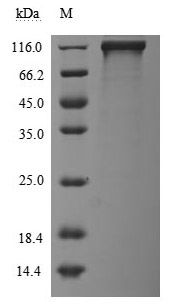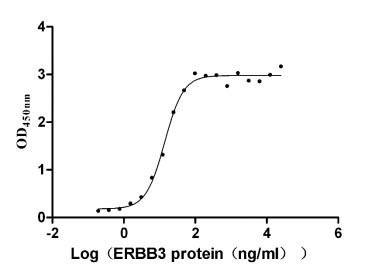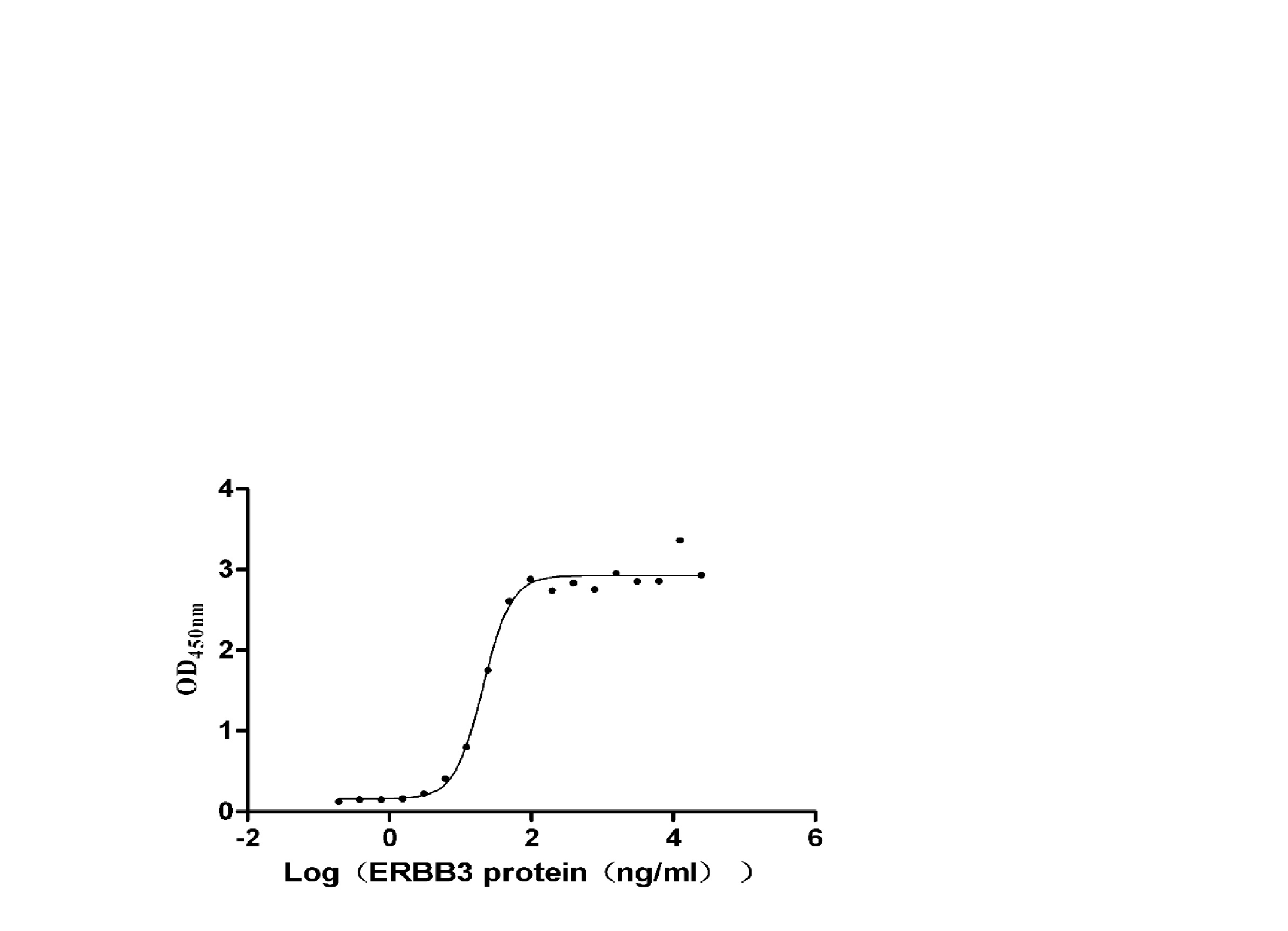The recombinant human ERBB3 protein is produced in mammalian cells by expressing a plasmid carrying the gene fragment encoding amino acids 20-643 of the human ERBB3 protein. This protein carries a C-terminal hFc-tag. The purified ERBB3 protein has a purity exceeding 95% as confirmed by SDS-PAGE and contains endotoxin levels below 1.0 EU/μg, as measured using the LAL assay. Biological activity testing confirms its functionality, and ELISA demonstrates its specific binding to the NRG1 (CSB-MP016077HU1(F6)) with an EC50 between 12.32 and 15.74 ng/mL.
The ERBB3, also known as HER3, lacks intrinsic tyrosine kinase activity but plays a crucial role in signaling pathways through dimerization with other ERBB family members, particularly ERBB2. This dimerization activates downstream signaling cascades, including the PI3K and MAPK pathways, which are essential for cell survival, proliferation, and differentiation [1][2].
ERBB3 is widely expressed in various tissues, including the mammary glands, prostate, and heart, and is involved in several physiological processes. It has been shown to regulate mammary epithelial survival and differentiation during pregnancy and lactation [3]. In the context of cancer, ERBB3 is often overexpressed and has been implicated in tumorigenesis, particularly in breast and prostate cancers. Its interaction with ERBB2 is critical, as the ERBB2/ERBB3 heterodimer is one of the most potent complexes for activating oncogenic signaling pathways [4][5]. Moreover, ERBB3 has been identified as a potential therapeutic target in cancer treatment, with monoclonal antibodies being developed to inhibit its signaling [5][6].
In addition to its role in cancer, ERBB3 has been associated with autoimmune diseases, such as type 1 diabetes (T1D). Genetic variations in the ERBB3 gene have been linked to an increased risk of T1D, suggesting that ERBB3 may influence immune responses and beta-cell function in the pancreas [7][8][9]. The gene's expression can be modulated by various factors, including insulin levels, which further highlights its role in metabolic regulation [8][9].
References:
[1] D. Shin, D. Lee, D. Hong, S. Hong, J. Hwang, B. Lee, et al. Oncogenic function and clinical implications of slc3a2-nrg1 fusion in invasive mucinous adenocarcinoma of the lung, Oncotarget, vol. 7, no. 43, p. 69450-69465, 2016. https://doi.org/10.18632/oncotarget.11913
[2] N. Jiang, N. Saba, & Z. Chen. Advances in targeting her3 as an anticancer therapy, Chemotherapy Research and Practice, vol. 2012, p. 1-9, 2012. https://doi.org/10.1155/2012/817304
[3] M. Williams, D. Vaught, M. Joly, D. Hicks, V. Sánchez, P. Owens, et al. Erbb3 drives mammary epithelial survival and differentiation during pregnancy and lactation, Breast Cancer Research, vol. 19, no. 1, 2017. https://doi.org/10.1186/s13058-017-0893-7
[4] S. Kawano, W. Ikeda, M. Kishimoto, H. Ogita, & Y. Takai. Silencing of erbb3/erbb2 signaling by immunoglobulin-like necl-2, Journal of Biological Chemistry, vol. 284, no. 35, p. 23793-23805, 2009. https://doi.org/10.1074/jbc.m109.025155
[5] L. Aurisicchio, E. Marra, G. Roscilli, R. Mancini, & G. Ciliberto. The promise of anti-erbb3 monoclonals as new cancer therapeutics, Oncotarget, vol. 3, no. 8, p. 744-758, 2012. https://doi.org/10.18632/oncotarget.550
[6] K. Meetze, S. Vincent, S. Tyler, E. Mazsa, A. Delpero, S. Bottega, et al. Neuregulin 1 expression is a predictive biomarker for response to av-203, an erbb3 inhibitory antibody, in human tumor models, Clinical Cancer Research, vol. 21, no. 5, p. 1106-1114, 2015. https://doi.org/10.1158/1078-0432.ccr-14-2407
[7] M. Maziarz, W. Hagopian, J. Palmer, C. Sanjeevi, I. Kockum, N. Breslow, et al. Non-hla type 1 diabetes genes modulate disease risk together with hla-dq and islet autoantibodies, Genes and Immunity, vol. 16, no. 8, p. 541-551, 2015. https://doi.org/10.1038/gene.2015.43
[8] H. Wang, Y. Jin, M. Reddy, R. Podolsky, S. Liu, P. Yang, et al. Genetically dependent erbb3 expression modulates antigen presenting cell function and type 1 diabetes risk, Plos One, vol. 5, no. 7, p. e11789, 2010. https://doi.org/10.1371/journal.pone.0011789
[9] D. Wang and G. Pan. The association between rs2292239 polymorphism in erbb3 gene and type 1 diabetes: a meta-analysis, Biomed Research International, vol. 2019, p. 1-7, 2019. https://doi.org/10.1155/2019/7689642






